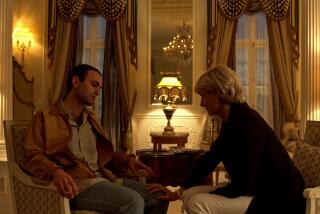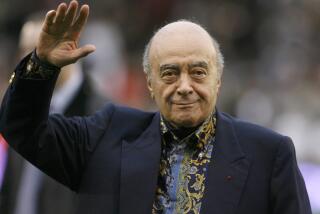Some in Egypt See More to Paris Crash
- Share via
CAIRO — Could Dodi Fayed and Princess Diana have married? Would she have changed her religion? Might a boy named Mohammed or a girl named Fatima have been the fruit of their union? These are questions being discussed in the press and on the streets of Egypt, Fayed’s native land.
And in the strange alchemy that sometimes forms public opinion here, a latent distrust of the West has been overlaid with the country’s own history of royal intrigue--dating to the time of the pharaohs--to produce a startling but widespread conclusion: that racism was the real reason the princess and her beau had to die.
“They killed Diana because she wanted to get married to a Muslim, and she herself was going to be a Muslim,” said Ahmed Mohammed Mahmoud, a robed security guard on duty outside a diplomatic residence on a hot, hazy afternoon this week. “Because in the West, they hate Muslims.”
Of course it was intentional, agreed taxi driver Fathi Mohammed Salem. “The man was Egyptian and a Muslim. Many Westerners had in mind that if Dodi married Diana, he would become more powerful.”
Even mainstream newspapers and magazines took up the theme. That two such bright lights had died simply because of bad judgment, bad driving and bad luck was hard for the many saddened people here to accept.
The Sept. 5 issue of the popular Egyptian magazine Al Mussawar, for instance, paraded its doubts on the cover--a composite photograph that portrayed Diana and Fayed holding hands and dressed as a bride and groom. “Who Killed Diana and Dodi, the Press . . . or Politics?” the headline asks.
A leading columnist for Egypt’s semiofficial Al Ahram newspaper put his suspicions more bluntly: “British intelligence is behind the assassination of Diana and Dodi because their love affair was a shock for the British royal family, the media and public opinion in the United Kingdom,” wrote Anis Mansour a day after the crash.
According to Mansour, the royal household saw Diana as a greater threat to its position than even the 17th century revolutionary leader Oliver Cromwell had ever been. And the possibility of an alliance of Diana and Fayed would be, he presumed, “a nightmare.”
“What if Diana got married to Dodi, a Muslim-Arab-Egyptian man?” he asked. “What if they had a child? The future king of Britain and head of its church would have an Arab Muslim brother or sister,” he wrote. “Thus, the only solution was to get rid of the couple.”
One reason many Egyptians have been quick to suspect foul play is that they already felt that the Fayeds, a family from Alexandria who parlayed oil connections to build a world-class fortune, have been shunned in their adopted country, Britain. Despite wealth and connections, Dodi’s father, Mohammed, failed repeatedly to win British citizenship, which many Egyptians took as proof of the boundless anti-Arab prejudice in the West and particularly in Britain.
There was also offense taken at the whiff of bigotry in some of the press coverage of Dodi and Diana after their friendship became public this summer.
“The love story revealed the depth of the racist element inside the British media,” wrote Al Ahram columnist Salama Ahmed Salama. “They connected all sorts of vices to the Al Fayed family only because, how dare this Egyptian love the British princess whose sons are heir to the throne?”
And in a country like Egypt--where paparazzi do not exist and where 100-mph street chases, even late at night, would be almost impossible due to traffic congestion--the initial explanation that photographers had apparently caused such a calamitous crash was hard to fathom. “Many people here in Egypt do not believe it, since proper photos cannot be taken from speeding motorcycles. I also heard the car had tinted windows so that no photos could be taken,” said journalist Mahmoud Kassas, quoted in the English-language Middle East Times. His verdict: an assassination made to look like an accident.
But Salama, the columnist, said he considered it “out of the question” for the British royal family to connive to get rid of Diana and Dodi that way. Such a plan, he opined, would be more “in the fashion of [Iraqi dictator] Saddam Hussein.”
Many others, however, said there was a sound historical basis to at least be skeptical about the accounts so far in the news media. “We know from history that intelligence organizations sometimes act in accordance with what they believe to be the interests of national security,” said Mohammed Nessim, a former intelligence officer, in the English-language Al Ahram weekly.
“There are precedents--accidents whose mystery was never resolved.”
More to Read
Sign up for Essential California
The most important California stories and recommendations in your inbox every morning.
You may occasionally receive promotional content from the Los Angeles Times.













